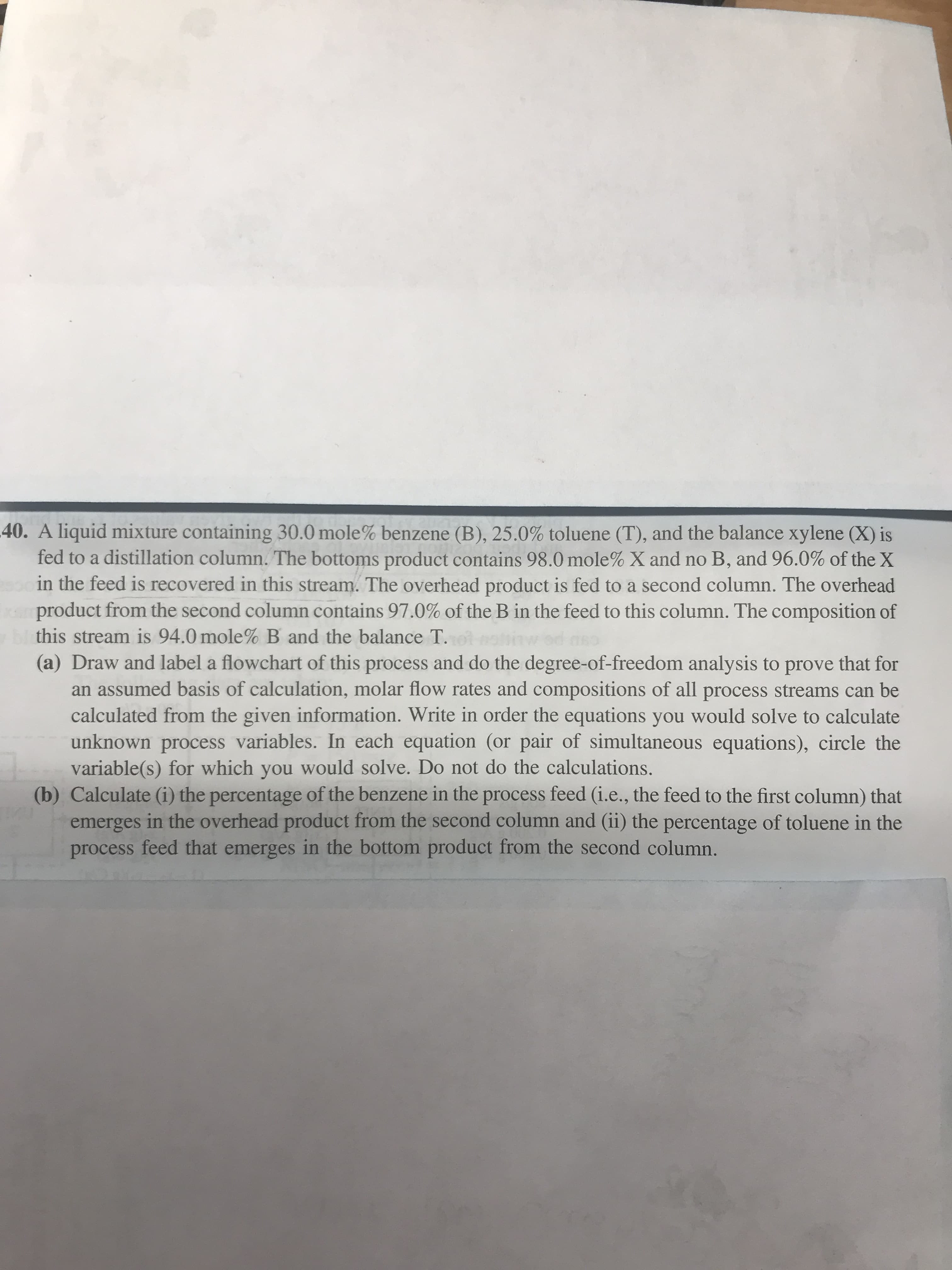40. A liquid mixture containing 30.0 mole% benzene (B), 25.0% toluene (T), and the balance xylene (X) is fed to a distillation column. The bottoms product contains 98.0 mole% X and no B, and 96.0% of the X in the feed is recovered in this stream. The overhead product is fed to a second column. The overhead product from the second column contains 97.0% of the B in the feed to this column. The composition of this stream is 94.0 mole% B and the balance T. (a) Draw and label a flowchart of this process and do the degree-of-freedom analysis to prove that for an assumed basis of calculation, molar flow rates and compositions of all process streams can be calculated from the given information. Write in order the equations you would solve to calculate unknown process variables. In each equation (or pair of simultaneous equations), circle the variable(s) for which you would solve. Do not do the calculations. (b) Calculate (i) the percentage of the benzene in the process feed (i.e., the feed to the first column) that emerges in the overhead product from the second column and (ii) the percentage of toluene in the process feed that emerges in the bottom product from the second column.
40. A liquid mixture containing 30.0 mole% benzene (B), 25.0% toluene (T), and the balance xylene (X) is fed to a distillation column. The bottoms product contains 98.0 mole% X and no B, and 96.0% of the X in the feed is recovered in this stream. The overhead product is fed to a second column. The overhead product from the second column contains 97.0% of the B in the feed to this column. The composition of this stream is 94.0 mole% B and the balance T. (a) Draw and label a flowchart of this process and do the degree-of-freedom analysis to prove that for an assumed basis of calculation, molar flow rates and compositions of all process streams can be calculated from the given information. Write in order the equations you would solve to calculate unknown process variables. In each equation (or pair of simultaneous equations), circle the variable(s) for which you would solve. Do not do the calculations. (b) Calculate (i) the percentage of the benzene in the process feed (i.e., the feed to the first column) that emerges in the overhead product from the second column and (ii) the percentage of toluene in the process feed that emerges in the bottom product from the second column.
Introduction to Chemical Engineering Thermodynamics
8th Edition
ISBN:9781259696527
Author:J.M. Smith Termodinamica en ingenieria quimica, Hendrick C Van Ness, Michael Abbott, Mark Swihart
Publisher:J.M. Smith Termodinamica en ingenieria quimica, Hendrick C Van Ness, Michael Abbott, Mark Swihart
Chapter1: Introduction
Section: Chapter Questions
Problem 1.1P
Related questions
Question

Transcribed Image Text:40. A liquid mixture containing 30.0 mole% benzene (B), 25.0% toluene (T), and the balance xylene (X) is
fed to a distillation column. The bottoms product contains 98.0 mole% X and no B, and 96.0% of the X
in the feed is recovered in this stream. The overhead product is fed to a second column. The overhead
product from the second column contains 97.0% of the B in the feed to this column. The composition of
this stream is 94.0 mole% B and the balance T.
(a) Draw and label a flowchart of this process and do the degree-of-freedom analysis to prove that for
an assumed basis of calculation, molar flow rates and compositions of all process streams can be
calculated from the given information. Write in order the equations you would solve to calculate
unknown process variables. In each equation (or pair of simultaneous equations), circle the
variable(s) for which you would solve. Do not do the calculations.
(b) Calculate (i) the percentage of the benzene in the process feed (i.e., the feed to the first column) that
emerges in the overhead product from the second column and (ii) the percentage of toluene in the
process feed that emerges in the bottom product from the second column.
Expert Solution
Trending now
This is a popular solution!
Step by step
Solved in 10 steps with 9 images

Recommended textbooks for you

Introduction to Chemical Engineering Thermodynami…
Chemical Engineering
ISBN:
9781259696527
Author:
J.M. Smith Termodinamica en ingenieria quimica, Hendrick C Van Ness, Michael Abbott, Mark Swihart
Publisher:
McGraw-Hill Education

Elementary Principles of Chemical Processes, Bind…
Chemical Engineering
ISBN:
9781118431221
Author:
Richard M. Felder, Ronald W. Rousseau, Lisa G. Bullard
Publisher:
WILEY

Elements of Chemical Reaction Engineering (5th Ed…
Chemical Engineering
ISBN:
9780133887518
Author:
H. Scott Fogler
Publisher:
Prentice Hall

Introduction to Chemical Engineering Thermodynami…
Chemical Engineering
ISBN:
9781259696527
Author:
J.M. Smith Termodinamica en ingenieria quimica, Hendrick C Van Ness, Michael Abbott, Mark Swihart
Publisher:
McGraw-Hill Education

Elementary Principles of Chemical Processes, Bind…
Chemical Engineering
ISBN:
9781118431221
Author:
Richard M. Felder, Ronald W. Rousseau, Lisa G. Bullard
Publisher:
WILEY

Elements of Chemical Reaction Engineering (5th Ed…
Chemical Engineering
ISBN:
9780133887518
Author:
H. Scott Fogler
Publisher:
Prentice Hall


Industrial Plastics: Theory and Applications
Chemical Engineering
ISBN:
9781285061238
Author:
Lokensgard, Erik
Publisher:
Delmar Cengage Learning

Unit Operations of Chemical Engineering
Chemical Engineering
ISBN:
9780072848236
Author:
Warren McCabe, Julian C. Smith, Peter Harriott
Publisher:
McGraw-Hill Companies, The